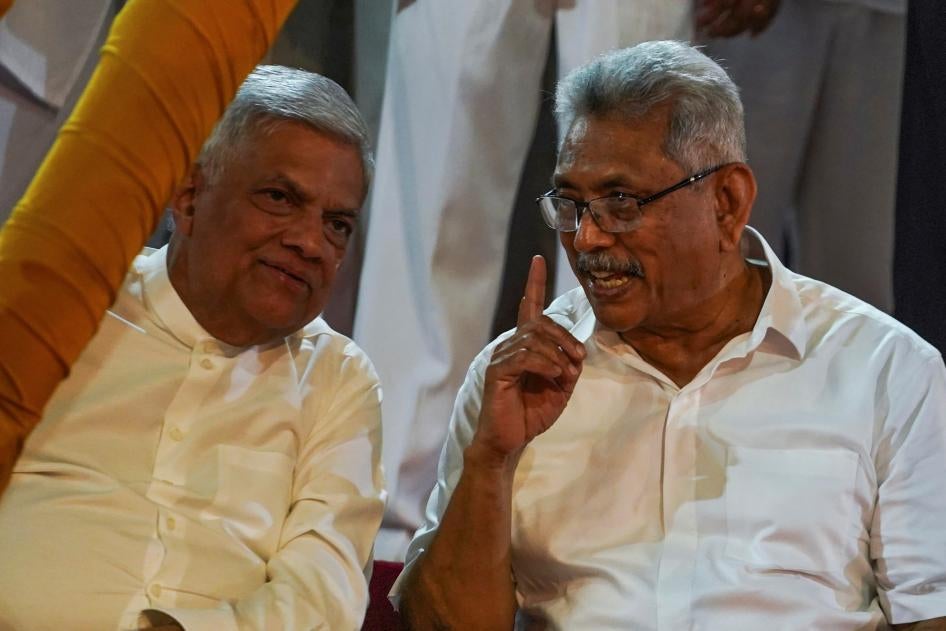Administration Has Moved to Stifle Criticism with a Raft of New, Repressive Laws
by Meenakshi Ganguly, Human Rights Watch, February 14, 2024
Published in:Scroll.in

President Ranil Wickremesinghe and former President Gotabaya Rajapaksa at the Navam Perahera festival in Colombo, Sri Lanka, on February 5, 2023. © 2023 Thilina Kaluthotage/NurPhoto via AP
Sri Lanka is still reeling from an economic crisis largely caused by misgovernance and lack of accountability. Public protests in 2022 forced the president and the prime minister, brothers Gotabaya and Mahinda Rajapaksa, to step down.
But instead of focusing on social justice and rights, the new government, led by President Ranil Wickremesinghe, is focused on suppressing dissent and limiting international attention on human rights.
Although it is the Rajapaksas that nominated – and are propping up – their successor, many foreign observers, including in India and the United States, had hoped that things would change.
Wickremesinghe, who had previously politically opposed the Rajapaksa-led party, was expected to reverse the authoritarian policies of the previous government, address entrenched corruption, stabilise the economy and even comply with international pledges to bring long-awaited justice for violations during the 1987-’89 insurgency in the south, and the 1983-2009 civil war in the north.
Instead, Wickremesinghe has moved forcefully to stifle criticism with a raft of new, repressive laws as the country prepares to hold a presidential election later this year. The Online Safety Act, adopted by parliament in January, creates vague and broad speech-related offenses punishable with lengthy prison terms.
The Anti-Terrorism Bill currently before parliament contains draconian powers, while the government continues to use the notorious Prevention of Terrorism Act to violate fundamental due process rights. A draft law to regulate non-governmental organisations, circulated by the government in January, could make it impossible for civil society organizations to function freely.
Back in 2015, when Wickremasinghe was the prime minister, he backed a consensus resolution at the United Nations Human Rights Council, committing to 25 key undertakings across a range of human rights issues, mostly related to the 1983-2009 civil war.
That government also pledged to provide answers to families of the “disappeared”, and to provide reparations for victims of abuses.
But there was little progress, and his government lost the next elections. Soon after Gotabaya Rajapaksa became president in 2019, he withdrew from the resolution, appointing officials implicated in war crimes and serious rights abuses to politically powerful and senior official positions. Numerous mass graves, in most cases discovered accidentally, have not been properly examined to identify the victims or their killers.
The UN Human Rights Council in a 2021 resolution established the Sri Lanka Accountability Project to gather evidence of international crimes for use in future prosecutions. With the resolution due for renewal in September 2024, Wickremesinghe, this time, is hoping to persuade the council to end its scrutiny of Sri Lanka.
But the government’s actions expose the need for continued international attention. Even as it has announced the Commission for Truth, Unity and Reconciliation in Sri Lanka Bill, purportedly to address civil war atrocities, the authorities continue to silence and repress the families of the disappeared.
Successive Sri Lankan governments have appointed at least 10 commissions since the 1990s to examine human rights violations and war crimes. The new law simply replicates previous failed efforts, ignores the needs of victims, and falls far short of meeting Sri Lanka’s international legal obligations.
Many victims say they have “commission fatigue”, and see no use in providing their testimony again, risking re-traumatisation and possible threats from security forces.
The government needs to urgently reverse course to meet its human rights obligations. That should include repealing or reforming the Online Safety Act to protect the rights to free expression and privacy; amending the Anti-Terrorism Bill to meet international human rights standards; imposing a moratorium on the use of the Prevention of Terrorism Act until it is repealed; and dropping the draft non-governmental organisations law, or any bill that constrains civil society.
The Wickremesinghe administration should work to correct the authoritarian legacy of its predecessors by safeguarding freedom of expression and letting civil society groups operate freely, particularly in the north and east.
It should stop arresting Tamil community members for the memorialisation of their war dead, and end government actions to appropriate Tamil and Muslim lands, including religious sites, in the north and east.
Sri Lankans are grappling with declining economic and social conditions, amid impunity for decades of human rights violations and for official corruption.
According to the United Nations World Food Programme, in 2023 more than 17% of the population was moderately or acutely food insecure and in need of humanitarian assistance, and 31% of children under 5 were malnourished. From 2021 to 2022, the country’s poverty rate doubled, to 25% and is projected to rise further.
In March 2023, a loan from the International Monetary Fund paved the way for multilateral institutions such as the World Bank and Asian Development Bank to offer new financing.
The International Monetary Fund programme focused on raising government revenues and emphasised tackling corruption and improving social protection. However, as structured, the program has shifted the burden of recovery principally onto people with low incomes, undermining people’s economic and social rights.
Wickremesinghe is afraid of Sri Lankans holding their government accountable. International partners, whom he relies upon to support his economic program, need to vigorously support democratic norms and the rule of law too.